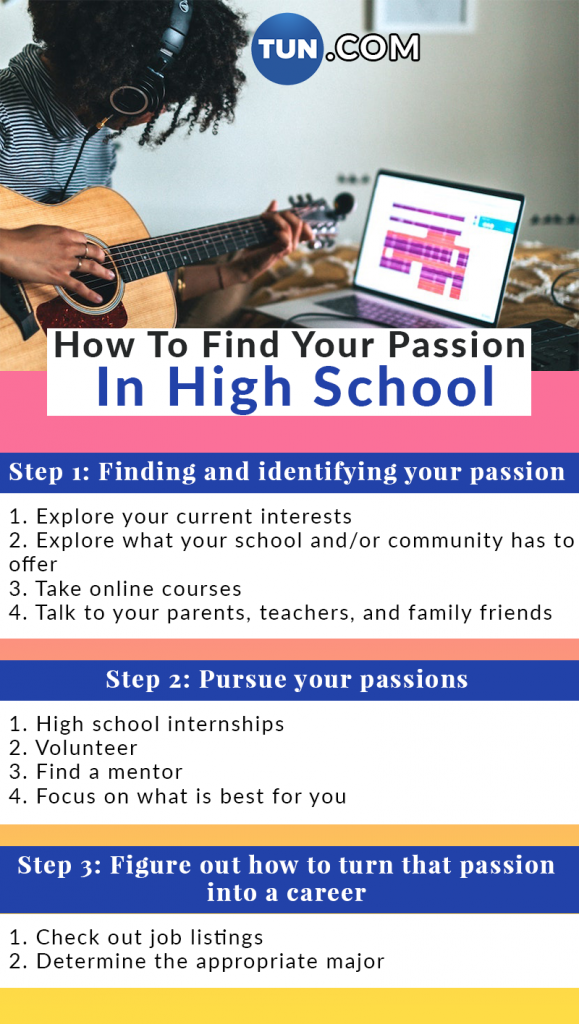There are few things in life that are more rewarding than identifying and pursuing something that you love. The earlier you’re able to find your passion, the better suited you will be to mold your career and life around it.
In high school, it is easy to get caught up in grades and test scores. Many students are only fixated on getting into a good college. But high school is also a tremendous time to start exploring and pursuing your passions so that you can begin to develop educational and career goals. This article will guide you through that process.

Step 1: Finding and identifying your passion
Identifying your passion isn’t a one-day task. It takes a lot of time, self-evaluation, and exploration. While you definitely don’t need to (and probably shouldn’t) have your life planned out before graduating high school, it helps to have at least a fundamental understanding of what you do and don’t like.
Explore your current interests
People don’t really change that much. The same things that you’re interested in now will likely be the same (or similar to) the things you’ll like when you’re an adult. It is really difficult to convince yourself to enjoy something that you don’t.
Pursuing a career you don’t like just because it is high-paying won’t be a decision that ends well. After just a few years, you may find yourself burnt out and striving for something new. For that reason, it is best to start your career journey by pinpointing what you love and figuring it out from there.
Kathleen Bellon Pizarro, a Harvard student in the class of ‘24, explained this sentiment beautifully in a recent blog post.
“Growing up, I was known as the avid cat-lover,” she wrote. “I would dress up as a cat every Halloween and (to my parents’ chagrin) adopted every stray cat that I found on the street. Sooner than later, my adoration for cats evolved into a care for animals. I convinced my mother to buy me a book on animal emergency room stories at a fair, and that is when I firmly decided that I would be a veterinarian one day. I ended up volunteering at my local animal hospital. It wasn’t a big job or anything: I was just a ten-year-old filing away pet information into folders and feeding the diaper-clad office cat. If I never became obsessed with cats and shadowed a surgery at the animal hospital, I never would have eventually discovered my passion for practicing medicine on humans. So, pursue that interest you have in whatever manner you like. You don’t know where it’ll take you!”
Explore what your school and/or community has to offer
Oftentimes, we gravitate towards liking what we are good at. To find out what you’re good at, you need to try many different activities. Conveniently, high school is probably the best time in your life to experiment.
Chances are, your high school offers sports, jazz band, orchestra, career-oriented clubs, and many other opportunities to help you identify your passion. The best advice is to try everything that sparks your interest. It will still be a rewarding experience, even if you’re left unsatisfied. When it comes to identifying your passion, there is also a lot of value in finding out what you don’t like.
Take online courses
There are thousands of free online courses covering nearly every subject available on MOOC sites like Coursera and edX. Many of these courses are taught by professors at some of the world’s most prestigious universities, including Harvard, Yale, Stanford, and others.
These courses will give you an idea of what you’ll learn at the university level and introduce you to some of the concepts, practices, and philosophies used by experts in a wide variety of fields. Many college students who go into college undeclared spend their first year taking classes across many disciplines and determining what sparks their interest. These online courses will give you a head start on that process.
Talk to your parents, teachers, and family friends
From a young age, typically by the time you’re 18 or 19 years old, you are expected to decide what you want to major in. In other words, you have to decide what subject you want to spend thousands of dollars and years of your life studying so that you can hopefully land a job in the field after graduation. But high schools and colleges often do a poor job explaining what to expect in terms of what your daily operations might be.
The only way to truly know what a field is like is by talking to professionals working in it. Have conversations with your parents, teachers, family friends, and all of the adults in your life about their current and past jobs. Ask if you can shadow them for a week in the summer to develop an understanding of their day-to-day tasks.
Step 2: Pursue your passions
Once you’ve identified a few passions by engaging in extracurricular activities, taking online courses, and talking to the adults in your life, it is time to pursue them further in more professional settings.
High school internships
There are hundreds of companies, including some of the world’s biggest, that run internship programs for students as young as freshmen in high school. Not only are internships impressive on a resume and a college application, but they are also a great way to test out career paths. With an internship, you get to witness, first-hand, what professionals do day-to-day. And depending on the size of the company or organization that you intern with, there’s a chance you’ll be thrown right into the thick of it, working side-by-side with full-time employees.
You can find many types of internships on TUN’s job search engine.
Volunteer
You have to apply and be selected for internships. To land volunteering gigs, all you typically have to do is sign up. There are dozens of volunteer opportunities available to you at all times, many of which may be in your own community.
Start the search process by looking and asking around at your school and at nearby companies, nonprofits, or community organizations. If you’ve identified a specific place where you would love to volunteer and they don’t have any opportunities listed, ask anyway! More often than not, groups will accept free help. And if they turn you down, at least you will be on their radar when opportunities do emerge!
There are also many websites that list volunteer opportunities. The best place to start is with TUN’s job search engine, where you can find hundreds of volunteer positions.
The benefits of volunteering are endless. Not only will you develop practical skills and make valuable connections that may benefit your future career, but you will also feel empowered, humbled, and transformed.
Find a mentor
Mentors are crucial when it comes to learning how to pursue your passions. Just like it would be difficult to learn calculus without a math teacher, it is much harder to turn your passion into a career without the guidance of someone who has done it before.
Remember earlier in the article when I told you to connect with the adults in your life and ask if you can shadow them? Well, reconnect with the one whose career excited you the most and ask them to be your mentor. It doesn’t have to be a formal thing. Your mentor is mostly there to give you advice when making decisions that may impact your future career.
It is also worth noting that you can (and should) have more than one mentor. As you further pursue your passion, you’ll meet people along the way who you can pick up as mentors.
Focus on what is best for you
When you know what you’re passionate about, you shouldn’t let what others are doing impact your personal decisions. Instead of following the pack and doing what your friends do, enroll in the groups, activities, and classes that interest and will be appropriate for you.
This sentiment is echoed in a blog post published by a Cornell University student.
“I attended a very competitive high school and a lot of my friends took every AP course they were allowed to,” the blog post states. “I often felt insecure, but, later on, I came to appreciate that most people cannot and should not pursue that kind of course load. Think about your interests and your goals, and how you plan to incorporate them into your schedule. There is no need to compare yourself to anyone because success is not a zero-sum game, meaning that happiness and opportunities are not finite resources.”
Step 3: Figure out how you can turn your passion into a career
Each passion can lead to many different careers. Say, for example, that your passion is writing. You could become a journalist, a creative writer, a copywriter, a content marketer, and so much more. Before you decide on a college major, you want to at least have an idea of what specific path you want to go down.
Check out job listings
Internships, volunteer opportunities, taking classes, and speaking/working with the adults in your life can help you decide which path to go down. But one of the best ways to identify the nuances between each career is to check out job listings.
Go on Indeed, Linkedin, or any other online job website and type in a few potential career paths. Sticking with the writing example, if you type in journalism, copywriting, or content marketing in the search bar, you’ll find the distinctions between what you would be expected to write each day and what qualifications employers are looking for.
Determine the appropriate major
Once you’ve narrowed down your passion and have an idea of what career you want to pursue, it is time to select a major.
It may ease your mind to know that the major you select, even if it seems specific, can lead to many different careers. So, you shouldn’t feel entirely locked in. We at TUN have published articles on dozens of majors to help you better understand which jobs your major could lead to.
But you should also know that it is okay to go into college undecided. If you aren’t certain or want some more time to explore, you should feel free to do so.
Once you’re in college, you can take some more classes to explore the subject(s) you’re interested in and meet the people who could potentially be your future colleagues. Additionally, once you’re officially enrolled, you’ll be assigned an academic advisor who can help you narrow down which path is right for you and mold your schedule to fit your passions.
Conclusion
You may still not know what you want to be when you grow up, and that is definitely okay. But, you should know that making that decision does take some work. To find and effectively pursue your passion, you need to be proactive and ambitious.



